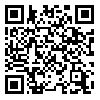BibTeX | RIS | EndNote | Medlars | ProCite | Reference Manager | RefWorks
Send citation to:
URL: http://mjiri.iums.ac.ir/article-1-3757-en.html
Background: People with disability experience various problems to access to healthcare services. This study aimed to identify cultural barriers in access to healthcare services for people with disability in Iran.
Methods: We conducted a qualitative study using content analysis to identify the cultural barriers. We used semi-structured interviews to collect data. Participants were selected through purposeful sampling with maximum variation. 50 individual interviews were conducted with three groups of people with disability, healthcare services providers and policy makers, September to May 2015, at different locations in Tehran, Iran.
Results: We identified a number of different cultural barriers in access to health services for people with disability in Iran. These related to health service providers, namely reluctance to provide health services and disrespect; related to People with disability, namely denial of disability, disproportionate expectation, shame and insufficient sociocultural supports; and related to policy makers, namely lack of concern, little attention to the culture of disability and discrimination. We categorized misconception as a barrier that was observed at all levels of the society.
Conclusion: Disability is a reality that some human being may experience and live with it. The negative attitude towards people with disability has a close relationship with the cultural norms of a society. The culture of disability in different dimensions should be a priority for all policy makers. Removing cultural barriers in access to healthcare for people with a disability needs collective efforts and collaborations among all stakeholders.
| Rights and permissions | |
 |
This work is licensed under a Creative Commons Attribution-NonCommercial 4.0 International License. |







